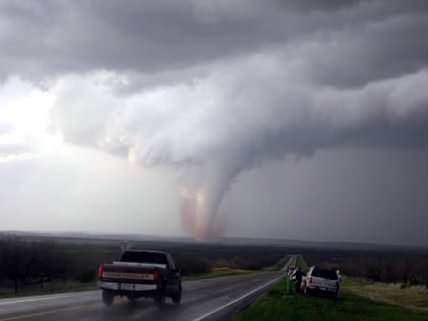Environmentalists Have Lost the Climate Change Debate
Admitting that executive power is the only way to move (tepidly) forward on climate change policy is basically admitting defeat.

The bloodcurdling National Climate Assessment is here, and it portends catastrophe; floods, clouds and other assorted weather events are imminent! But, says the report, "there is still time to act to limit the amount of climate change and the extent of damaging impacts."
Have you noticed that we're always at the cusp of a cataclysm yet the deadline to act always moves to a politically convenient not-too-distant future? I guess that when the time to act runs out—it will at some point, right?—we can begin thinking about defunding all these panels and reinvesting in something more productive, such as figuring out how we can adapt to the future.
For now, though, the congressionally mandated report claims we're no longer merely dealing with impending disaster. The United States, it asserts, has already incurred billions of dollars in damages from severe weather-related disruptions because of climate change. The political hope is that some of this ugly weather will generate more urgency to do something. President Barack Obama will use the report to bolster his case for unilaterally enacting carbon dioxide regulations, neglecting, one imagines, to mention that though there is consensus regarding anthropogenic climate change, there isn't much agreement on whether severe weather has actually gotten worse over the past years or, if it has, that climate change is the cause.
Nevertheless.
"We're committed to moving forward with those rules," White House counselor John Podesta said in a bit of an anti-democratic rant the other day. "We're committed to maintaining the authority and the president's authority to ensure that the Clean Air Act is fully implemented." Don't worry, though. Podesta says this is "actionable science," so separation of powers and consent of the governed and other trifling concerns are no longer applicable.
But really, after all these years, admitting that executive power is the only way to move (tepidly) forward on climate change policy is basically admitting defeat. Has there ever been a movement that's spent as much time, energy, and treasure and gotten so little in return? I suspect there are three reasons for this failure: 1) It's difficult to fight basic economics. 2) On energy, Americans, despite what they say, have no desire to try (nor should they). 3) It's getting more difficult, not less, to believe environmental doom and gloom.
"There will always be people in this country who say that we've got to choose between clean air, clean water, and growing the economy, between doing right by the environment and putting people back to work," Obama said a couple of years ago. "I'm here to tell you that is a false choice." Well, actually, we already have cleaner air and water, and we (typically) have a growing economy. The thing is there is consensus among economists that regulations do have a cost. Sometimes the price tag is worth it. Oftentimes it's not.
We already have a test case for Obama's proposition in California, the state with the most aggressive renewables portfolio standard. A mandated 33 percent of its power must be renewable energy by 2020. According to the Energy Department, residential electricity prices have already spiked 30 percent between 2006 and 2012 (when adjusted for inflation), and studies show that the cost of electricity is likely to jump 47 percent over the next 16 years. Those are real-world costs that every Californian has to divert from health care or groceries or education or investments to pay for artificially inflated energy prices.
The truth is that even if Americans believed that scientists have seer-like abilities and the models are accurate, they would still be hesitant to embrace 19th-century technology, because they simply can't afford it. Though I suspect that most people instinctively understand that the environment has gotten better by almost every measure over the past 40 years, climate change activists ignore the massive benefits of carbon-emitting fuels and technology that helps us become more productive and increasingly efficient.
Now, you can try to guilt trip everyone into compliance. You can batter people with distressing hypothetical scenarios. You can "educate" them on the issue from kindergarten onward. You can mainstream an array of Luddite ideas. You can browbeat society so no one ever utters a word of skepticism. But we still want to drive our cars everywhere.
Yes, when asked, Americans perfunctorily tell pollsters that climate change matters to them. A recent Pew Research Center poll found that 40 percent of Americans believe that climate change is a major threat. A Gallup poll survey found that about a third of Americans personally worry about climate change. But when they're not asked specifically about global warming, voters never bring the topic up. Their most important concerns are the economy, jobs, and debt. There is always strong support for the abstract idea of environmental regulation and "clean energy," but when it comes to some concrete policy, it is nearly always unpopular. Few people want to stop the Keystone XL pipeline. Few people support new emissions regulations. And I doubt that another scaremongery study will change that reality.


Show Comments (141)